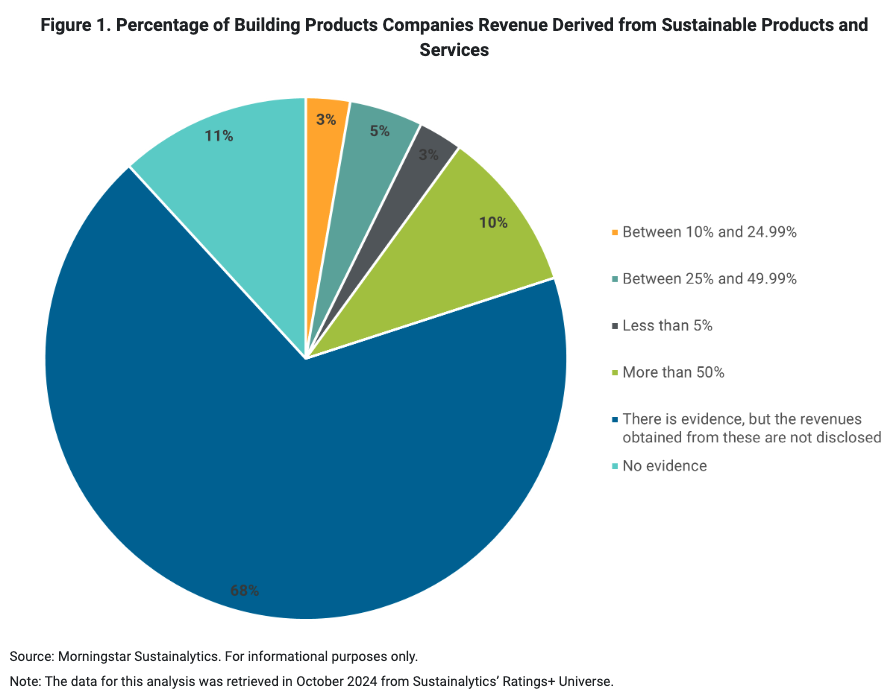90% of Building Products Firms Profit From Sustainable Products: Morningstar Sustainalytics

Key Impact Points:
- Sustainability Leading Growth: 90% of building products companies generate revenue from sustainable products and services, reflecting a shift in industry practices.
- Transparency Gap: 68% of companies offer sustainable solutions but fail to report specific revenue figures tied to these products.
- Europe Setting the Pace: Europe leads globally, with more companies deriving over half of their revenues from sustainable solutions compared to other regions.
The global transition to sustainability is being strongly influenced by the building products industry. According to a recent report from Morningstar Sustainalytics, nearly 90% of the 110 building products companies surveyed generate a portion of their revenue from sustainable products and services. This is a significant management indicator, particularly as the world increasingly focuses on the importance of energy-efficient and eco-friendly solutions in construction.
The building products sector is integral to shaping a sustainable future, especially as construction demands grow with the global population. Decisions made today about how buildings are constructed and maintained will determine the sector’s long-term energy consumption and emissions. Buildings currently account for more than 30% of global energy consumption, and the industry is under pressure to meet net-zero targets as outlined in the Paris Agreement.
Lack of Transparency in Revenue Reporting
Despite the encouraging statistic that 90% of companies are engaging in sustainability, 68% of these companies do not report how much of their revenue comes specifically from sustainable solutions. This lack of transparency highlights a major challenge: investors and regulators are often left without clear data to assess the actual impact of these companies’ sustainability initiatives. As the ESG (Environmental, Social, and Governance) landscape continues to evolve, it will be critical for companies to provide more detailed and consistent disclosures about their sustainability-related revenues.

Europe Leading the Sustainability Charge
Europe is at the forefront of integrating sustainability into the building products industry. It has the largest number of companies that derive over 50% of their revenues from sustainable solutions, driven by the EU’s regulatory pressures. Initiatives like the EU Renovation Wave, part of the European Green Deal, aim to double annual energy renovation rates by 2030. This, alongside the updated Energy Performance of Buildings Directive, which mandates that all new buildings must be net-zero by 2030, is pushing companies to adopt sustainable practices quickly.
“These regulations are key drivers behind Europe’s leadership in sustainable building practices,” notes the Morningstar Sustainalytics report.
Green Buildings: Benefiting Planet, People, and Profits
Green buildings are not just beneficial for the environment but also deliver financial advantages and improve occupant well-being. According to the World Green Building Council, green buildings in the U.S. use 25% less energy compared to non-green buildings, while in India, this figure can reach up to 50%. Green buildings are also more cost-effective in the long run, reducing operating expenses through lower energy and water consumption, and commanding higher rents and sale prices due to their appeal to sustainability-conscious buyers.
Furthermore, the LEED (Leadership in Energy and Environmental Design) certification system reinforces these benefits, noting that certified buildings typically have higher resale values, lower operational costs, and contribute to better public health by offering healthier indoor environments.
Innovative Companies Driving Sustainability
Notable examples of companies leading the sustainability charge in the building products industry include Saint-Gobain and Rockwool. In 2023, Saint-Gobain, a French construction manufacturer, reported that 73% of its sales came from sustainable products, driven by a methodology that assesses both sustainability and product performance. Denmark-based Rockwool, known for its stone wool insulation products, derived 77% of its total sales from green solutions in 2023. These products not only enhance energy efficiency but also support resilience against extreme weather events.
Another key player, Trane Technologies, reported that 41% of its 2023 net revenue came from energy-efficient and low-emission solutions aligned with the UN’s Sustainable Development Goals (SDGs). These innovative products, such as electric heat pumps and smart building management systems, offer scalable solutions for reducing carbon emissions in buildings globally.
A Forward-Looking Investment Opportunity
For investors, the building products industry offers a unique opportunity to support the transition to a greener built environment while generating strong financial returns. The industry’s steady shift toward sustainability aligns with global net-zero goals and growing market demand for eco-friendly solutions. As sustainability continues to drive revenue growth, particularly in regions like Europe, companies that are leading this transition stand to benefit from both regulatory incentives and heightened consumer awareness.
Considering companies from the building products industry in an investment portfolio not only demonstrates a forward-thinking strategy from a financial standpoint but also contributes to broader efforts to mitigate climate change and build a more sustainable future.








